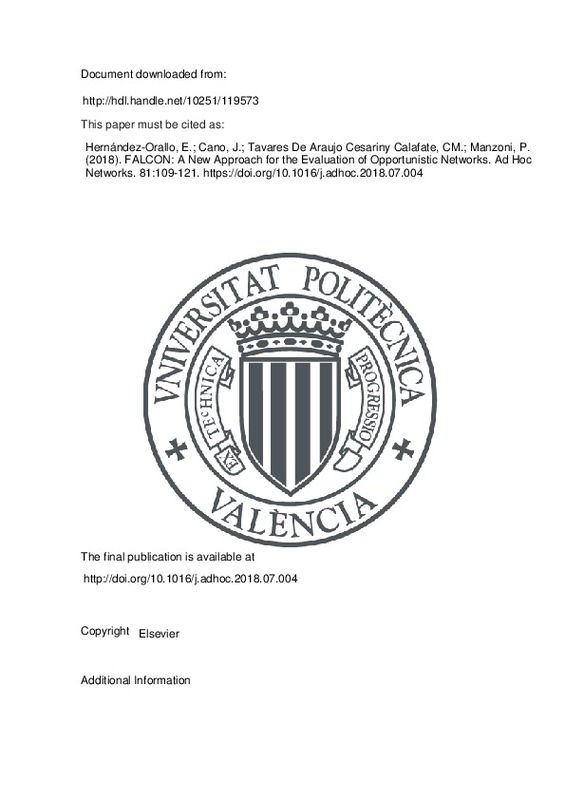JavaScript is disabled for your browser. Some features of this site may not work without it.
Buscar en RiuNet
Listar
Mi cuenta
Estadísticas
Ayuda RiuNet
Admin. UPV
FALCON: A New Approach for the Evaluation of Opportunistic Networks
Mostrar el registro sencillo del ítem
Ficheros en el ítem
| dc.contributor.author | Hernández-Orallo, Enrique
|
es_ES |
| dc.contributor.author | Cano, Juan-Carlos
|
es_ES |
| dc.contributor.author | Tavares De Araujo Cesariny Calafate, Carlos Miguel
|
es_ES |
| dc.contributor.author | Manzoni, Pietro
|
es_ES |
| dc.date.accessioned | 2019-04-25T20:00:44Z | |
| dc.date.available | 2019-04-25T20:00:44Z | |
| dc.date.issued | 2018 | es_ES |
| dc.identifier.issn | 1570-8705 | es_ES |
| dc.identifier.uri | http://hdl.handle.net/10251/119573 | |
| dc.description.abstract | [EN] Evaluating the performance of opportunistic networks with a high number of nodes is a challenging problem. Analytical models cannot provide a realistic evaluation of these networks, and simulations can be very time-consuming, sometimes requiring even weeks only to provide the results of a single scenario. In this paper, we present a fast evaluation model called FALCON (Fast Analysis, using a Lattice Cell model, of Opportunistic Networks) that is computationally very efficient and precise. The model is based on discretising space and time in order to reduce the computation complexity, and we formalised it as a discrete dynamic system that can be quickly solved. We describe some validation experiments showing that the precision of the obtained results is equivalent to the ones obtained with standard simulation approaches. The experiments also show that computation time is reduced by two orders of magnitude (from hours to seconds), allowing for a faster evaluation of opportunistic networks. Finally, we show that the FALCON model is easy to adapt and expand to consider different scenarios and protocols. | es_ES |
| dc.description.sponsorship | This work was partially supported by Ministerio de Economia y Competitividad, Spain, grant TEC2014-52690-R. | |
| dc.language | Inglés | es_ES |
| dc.publisher | Elsevier | es_ES |
| dc.relation.ispartof | Ad Hoc Networks | es_ES |
| dc.rights | Reconocimiento - No comercial - Sin obra derivada (by-nc-nd) | es_ES |
| dc.subject | Opportunistic networks | es_ES |
| dc.subject | Performance | es_ES |
| dc.subject | Evaluation | es_ES |
| dc.subject | Simulation | es_ES |
| dc.subject.classification | ARQUITECTURA Y TECNOLOGIA DE COMPUTADORES | es_ES |
| dc.title | FALCON: A New Approach for the Evaluation of Opportunistic Networks | es_ES |
| dc.type | Artículo | es_ES |
| dc.identifier.doi | 10.1016/j.adhoc.2018.07.004 | es_ES |
| dc.relation.projectID | info:eu-repo/grantAgreement/MINECO//TEC2014-52690-R/ES/INTEGRACION DEL SMARTPHONE Y EL VEHICULO PARA CONECTAR CONDUCTORES, SENSORES Y ENTORNO A TRAVES DE UNA ARQUITECTURA DE SERVICIOS FUNCIONALES/ | es_ES |
| dc.rights.accessRights | Abierto | es_ES |
| dc.contributor.affiliation | Universitat Politècnica de València. Departamento de Informática de Sistemas y Computadores - Departament d'Informàtica de Sistemes i Computadors | es_ES |
| dc.description.bibliographicCitation | Hernández-Orallo, E.; Cano, J.; Tavares De Araujo Cesariny Calafate, CM.; Manzoni, P. (2018). FALCON: A New Approach for the Evaluation of Opportunistic Networks. Ad Hoc Networks. 81:109-121. https://doi.org/10.1016/j.adhoc.2018.07.004 | es_ES |
| dc.description.accrualMethod | S | es_ES |
| dc.relation.publisherversion | http://doi.org/10.1016/j.adhoc.2018.07.004 | es_ES |
| dc.description.upvformatpinicio | 109 | es_ES |
| dc.description.upvformatpfin | 121 | es_ES |
| dc.type.version | info:eu-repo/semantics/publishedVersion | es_ES |
| dc.description.volume | 81 | es_ES |
| dc.relation.pasarela | S\371550 | es_ES |
| dc.contributor.funder | Ministerio de Economía y Empresa | es_ES |







![[Cerrado]](/themes/UPV/images/candado.png)

